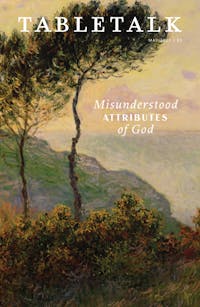
Request your free, three-month trial to Tabletalk magazine. You’ll receive the print issue monthly and gain immediate digital access to decades of archives. This trial is risk-free. No credit card required.
Try Tabletalk NowAlready receive Tabletalk magazine every month?
Verify your email address to gain unlimited access.
Christians worship the true God, whose proper name is “I am” (Ex. 3:14). Some may perhaps regard this as a weightless and impoverished name for God. After all, can we not say “it is” about everything that is real, from elephants to electrons? How, then, is the name “I am” a peculiar and meaningful name for the God we worship and upon whom we depend for life, breath, and all things (Acts 17:25)? The context of God’s remarkable self-disclosure of His name to Moses in Exodus 3 is His promise to deliver Israel from its bondage in Egypt. Moses confesses his own self-insufficiency for this redemptive work (Ex. 3:11). To assure Moses and the children of Israel that He is perfectly sufficient for this almost unimaginable salvation, God identifies Himself with this unusual moniker. This name indicates the reason for God’s perfect reliability.
Theologians have long understood this name to signal God’s unqualified self-sufficiency and boundless plenitude of being. God does not say to Moses “I am this” or “I am that” but simply “I am who I am.” He does not specify or contract His act of being to anything in particular, thus divulging to us the incomprehensible truth that He simply is His own is, His own reason for being. This is precisely why we can depend on Him utterly and unreservedly—because He does not depend on anything, not even an act of existence, that is really distinct from Himself. If God were in any way a dependent being, all our confidence in Him would have to be grounded in something more fundamental in reality than God. Yet Holy Scripture is abundantly clear that there is nothing more basic and absolute in being than God. He is the One from whom, through whom, and to whom are all things (Rom. 11:36). We can trace out the causal explanation for all nondivine beings and events ultimately to God Himself. And if we ask, “Why God?” the answer is simply “God.” As “I am,” God just is the is by virtue of which He exists. Properly speaking, God does not “have” existence but rather “is” existence itself subsisting, as has been affirmed by orthodox Christian theologians across the centuries. His existence contains within it all the reality that we ascribe to Him—His wisdom, power, goodness, justice, love, truth, and so on. God’s is should be thought of as the infinite fullness of being and not as the stripped-down notion of merely “being there.”
The nickname given to this doctrine of God’s independent self-sufficiency is aseity. This is adapted from the Latin a se, which means “from himself” or “of himself.” Perhaps it would be helpful to think of this as the doctrine of God’s of-Himself-ness. The Dutch Reformed theologian Herman Bavinck says that “when God ascribes this aseity to himself in Scripture, he makes himself known as absolute being, as the one who is in an absolute sense.” Bavinck adds, “By this perfection he is at once essentially and absolutely distinct from all creatures.” Creatures, just because they are creatures, depend on causes of their being in order to exist, to possess the particular natures they do, to operate as they do, and so forth. But God does not exist or operate with any such reliance on causes. He gives to all but receives from none. As God asks Job in Job 41:11: “Who has first given to me, that I should repay him? Whatever is under the whole heaven is mine.”
Misunderstanding can sometimes arise over God’s aseity and independence. First, it should be noted that aseity does not mean God is the cause of Himself. He is from or of Himself in that He is the perfectly adequate reason for His own existence, essence, and operation. This is not the same as saying He causes Himself. As the absolute first cause of all created things, God is not to be counted among the things that are caused to be. If He were, He would not be the absolute first cause; something would precede Him in being. It should also be noted that a thing cannot be the cause of itself in any strict sense inasmuch as causing is an operation that requires the existence of the operator as a necessary precondition. One cannot do if one is not.
Second, divine aseity does not mean that God is independent of external causes though somehow existing in dependence on internal causes. Some modern theologians assert that aseity means only that God does not depend on causes outside Himself, while leaving open the possibility that He is composed of parts and thus somehow dependent on the parts of which He is composed. Suffice it to say, if God were composed of internal parts, He would still require some external agent to supply unity to those parts, and thus the problem of external dependence would not be avoided. Aseity means that God is independent of all causes, whether from within (as parts) or from without (as a composer or efficient cause).
Finally, one might be concerned that divine aseity somehow cuts off God from a meaningful and intimate relationship with His creatures. If God is truly independent in every aspect of His being and life, how does that not result in the distant god of Deism? Christians certainly ought not to think of God as remote or distant from His creatures. In Him we live, move, and have our being (Acts 17:28). Aseity means the inverse is not so. God does not live, move, or have His being in or from the creature. He is as near to each of us as the very act of being by which we exist because He is the immediate cause of that act. But He is not near to us in such a way that He derives anything from us. It is because He is “I am,” and so a se, that He can supply everything for us—existence, essence, and activity. These are conveyed to us from God’s own perfect plenitude of being. So far from removing God from us, His aseity is the very reason that He can be so near to us in such exquisite superabundance and provision. He is near us as Giver, not as Getter.

The doctrine of divine simplicity is often coupled with God’s aseity. In one respect, simplicity is just a mechanism for maintaining the truth of God’s aseity and independence. The doctrine claims that God is without parts. This teaching can be found in the writings of the church fathers, the medieval scholastics, and the early generations of Protestant theologians. It is also enshrined in several of the better-known Reformed confessions. Things composed of parts depend on their parts for some aspect of their being. What’s more, parts are really distinct from the wholes composed of them. A steering wheel is not a car. A petal is not a flower. The form of caninity is not a dog. A material body is not a man. And so forth. Each of these parts is necessary for some aspect of the being of the whole in which it is incorporated. And though the composite whole is greater in being than any one of its parts, it nevertheless depends on its parts for its being. If God is the absolute first cause of being, the One who is “I am” in all the existential richness of that name, then He cannot exist like those beings that depend on parts.
Divine simplicity has profound theological implications. It means that God does not have His existence, essence, or attributes as components from which He derives the unity of His being. Rather, God simply is His existence, essence, and attributes. His unity of being is not the consequence of something more fundamental than Himself. It also means that God’s attributes, though distinct in our conceptions and in our God-talk, do not exist in God as a set of really distinct properties. The Puritan John Owen writes, “The attributes of God, which alone seem to be distinct things in the essence of God, are all of them essentially the same with one another, and every one the same with the essence of God itself” (emphasis added). This means that God just is the love by which He loves, the wisdom by which He is wise, the power by which He is powerful, and so forth. And each of these divine virtues is nothing but divinity itself, the very Godness of God. Divine simplicity does not merely assert a harmony among God’s attributes—that could be said about the attributes of holy angels—but rather claims that each attribute, though variously disclosed and understood by us, is really nothing but the simple God Himself.
For all the mystery that attends the doctrines of aseity and simplicity, it should be clear that God would not be God if He were not perfectly self-sufficient and uncompounded. Because He is not composed of parts, He cannot fall apart on us. There just are no parts into which He might fall. It is because He is a se and simple that we can cast ourselves on Him and His Word utterly and unreservedly.
